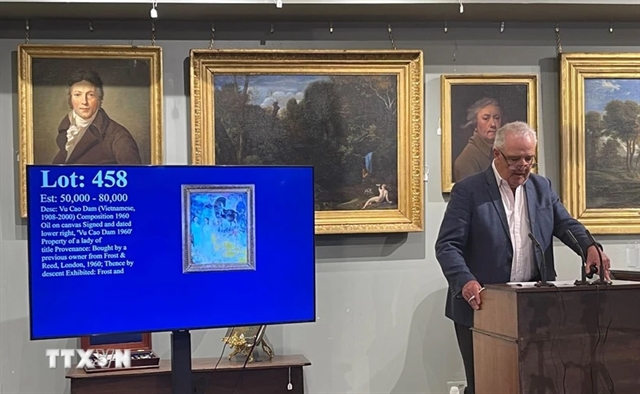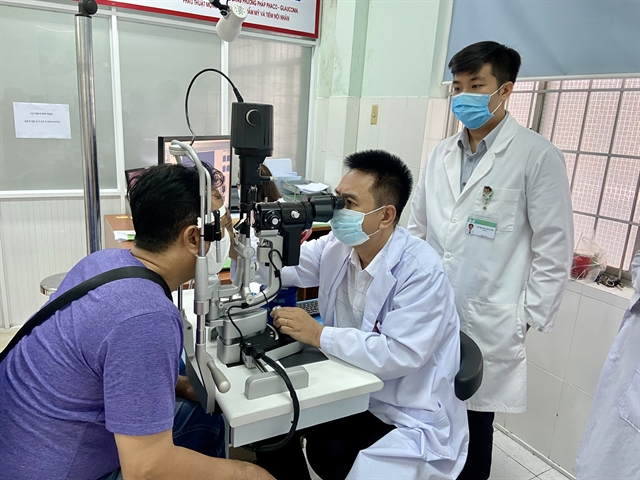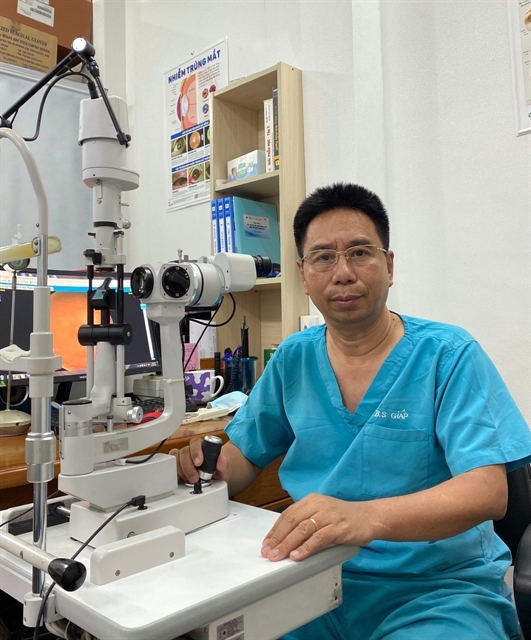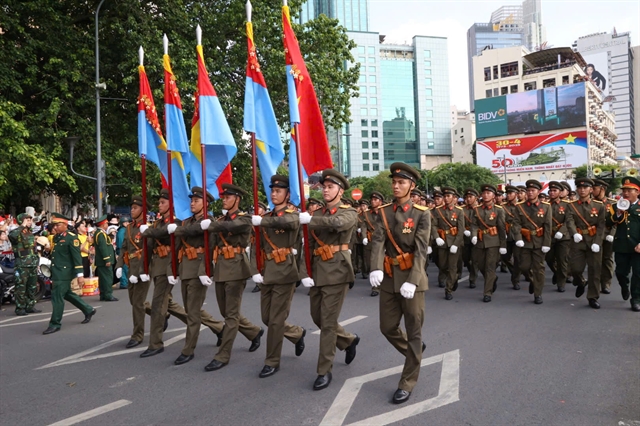 Society
Society


|
| Doctor Nguyễn Viết Giáp (sitting), Director of Bà Rịa-Vũng Tàu Eye Hospital, examines a patient. Photo baobariavungtau.com.vn |
BÀ RỊA-VŨNG TÀU — Doctor Nguyễn Viết Giáp, director of Bà Rịa-Vũng Tàu Eye Hospital, has been honoured with the 2023 Asia-Pacific Academy of Ophthalmology (APAO) Outstanding Service in the Prevention of Blindness Award.
This is the most prestigious award in the Asia-Pacific region's ophthalmology field, which comprises more than 40 countries and regions.
Giáp is the sixth member of the Vietnam Ophthalmological Society to receive the award since the association was set up 65 years ago.
In the nomination letter to the APAO Award Committee, Professor Tôn Thị Kim Thanh, President of the Việt Nam Ophthalmological Society, described Giap as a dedicated, highly skilled doctor with many creative ideas and great contributions to ophthalmological examination, treatment activities and blindness prevention in the community.
After graduating from the HCM City University of Medicine and Pharmacy in 1990, Giáp spent three years working at the university. Giáp said it was a good time for him as he could attend a level-one training course specialising in ophthalmology.
He remembered that at that time, there was only one ophthalmologist in the central province of Bà Rịa-Vũng Tàu, so in 1993, Giáp moved to work for Lê Lợi Hospital, responsible for its eyes clinic.
Two years later, he was appointed head of the hospital's Inter-Specialty of Eye, Ear, Nose, Throat and Maxillofacial. Since then, Giáp started to build and develop a network of ophthalmologists and established the provincial blindness prevention and control programme.
In 2006, the Department of Health appointed Giáp as Director of the Eye Centre (now the Provincial Eye Hospital). From an eye clinic with modest equipment and only three doctors, the centre has developed into a Grade II Eye Hospital, with a scale of 100 beds, many modern equipments and 22 skilled doctors.
So far, the province has 40 doctors, more than 50 nurses, 30 refraction technicians and 20 glass grinding technicians.
All district health centres in the province have eye doctors and eye clinics. In addition, all health stations in communes, wards and townships have primary eye care staff and basic eye screening equipment to serve the people.
Along with directly giving check-ups and treatment to tens of thousands of patients, Giáp has actively engaged in training activities. He has organised more than 200 training courses for over 2,500 medical staff in localities and schools, along with more than 10,000 consultation events on eye protection in the community.
Remarkably, he has given many initiatives in blindness prevention in the community.
"I have had a passion for researching since I was a university student," Giáp said.
Among his initiatives are the project "Intervention to improve knowledge, attitude and behaviour of eye care of students in Bà Rịa-Vũng Tàu Province" and "A comprehensive community eye care model to lower the rates of visual impairment and blindness".
Over the past ten years, thanks to the initiatives, over 114,000 elderly people have received free medical examination and treatment and more than 17,500 people underwent eye surgery, which contributed to lowering the rate of blindness in people over 50 years old in his province from 3.31 per cent in 2007 to 1.69 per cent in 2020.

|
| Doctor Nguyễn Viết Giáp. — VNA/VNS Photo |
The coverage index for cataract surgery per million people (CSR) averaged over 2,663 cases per million people, exceeding the recommendation of the World Health Organisation - 2,500 cases per million people since 2017.
More than 200,000 students have been screened for free and more than 15,000 poor students were given glasses, increasing the rate of glasses use among students with refractive errors from 32.7 per cent in 2012 to 91.3 per cent in 2021.
With the support of Brien Holden Vision Institute, Giáp also successfully built five community vision centres, providing quality eyeglasses services at reasonable prices for more than 112,000 people.
The achievements and contributions of Doctor Giáp have been recognised domestically and internationally.
"I am fortunate to be well educated and trained. As a result, I am aware of my professional responsibility for people's health care," Giáp said.
"I do not mind difficulties seeking treatment methods and improving skills so that I could offer my patients the best treatment I can," he emphasised. — VNS









